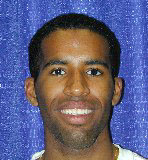Olympic Interview: 21-Year-Old Fencer Keeth Smart

| Interview: Keeth Smart |
| 21-year-old fencer Keeth Smart on Olympic training, modeling for GQ, and what isn't shown on TV |
by John Gettings |
 21-year-old Olympic fencer Keeth Smart. (Source: Cindy Bent, U.S. Fencing Assn) |
If you answered "fencing," you would be one of the few who know about this mysterious sport. One person who does know about fencing is 21-year-old U.S. Olympic Fencing Team member Keeth Smart.
A Brooklyn, N.Y., native and student at St. John's University, Smart will be competing in the men's sabre competition. He will also be joined by his younger sister Erin, who qualified in the women's team foil competition.
Before he left for Australia, Keeth explained to Infoplease Editor John Gettings what it takes to be a good fencer and to compete in front of the world.
What are you expecting in Sydney?The biggest thing I've ever been involved in; people from all over the world; a lot of fun and hopefully, some friendly competition.
How does it feel to be one of the 40 best fencers in the world?It definitely feels special. At any other competition there are between 90 -200 (fencers). This is the most elite competition in the world and it only happens every four years.
| The theatrical interpretation of fencing—the big movements and lots of blade contact—there's not too much to that extent (in real competition). It's a lot faster and a lot more athletic driven. It's all about how strong your legs are. |
I'd love to go see the outback—the kangaroos, the koalas. I'd like to get a chance to see some of the Australian aborigines but I'm not sure how much time I'll have for all that. I'll be content staying in Sydney. Everyone says the harbor is really nice.
How many family members are coming?Two, my mom and my aunt.
Do you have any superstitions or lucky rituals you do before bouts?Not anymore. I did once before, but it didn't work at one competition, so I stopped using it.
What did your friends think of you learning how to fence?First they thought it was weird. Then they learned to accept it when they saw me traveling all over the world getting trophies and medals. They would get impressed when they saw my trophy display.
How did you get into fencing?My parents saw an article about The Peter Westbrook Foundation and they thought it would be nice for sis and I to try something different.
Your sister was the first to go?Yeah, sis started, and then I came along for the ride next time around.
What did you think?I thought it was different. At the time I didn't know too much about it, just what I knew from movies and TV.
Was it different from what you saw on TV and in the movies?The theatrical interpretation—the big movements and lots of blade contact—there's not too much to that extent (in real competition). It's a lot faster and a lot more athletic driven. It's all about how strong your legs are. That's what they noticed about me right away. They thought I had strong legs from playing basketball and football. They thought I'd be a good fencer.
What's the hardest thing to learn?Footwork. It's not hard technically, but you have to remember to keep footsteps small. You have a tendency to get excited and rush it and take big steps and then lose your balance. You might be able to get away with that against lesser opponents, but not at the Olympic level, they'll catch you.
How often do you practice?Five to six hours a day, five or six days a week…of the six hours, four hours is spent fencing and the other two hours is running, (weight) lifting, or bike riding.
Anything exciting/surprising happen since you made the team?I'm in GQ right now (August 2000) with all these proven athletes like Maurice Greene and Dan O'Brien. I didn't see that coming. I've never even been to an Olympics. That's been the biggest shock yet.
| RELATED LINKS |
| Interview: Peter Westbrook Olympics Overview Peter Westbrook Foundation U.S. Fencing Online Fencing Preview |
I've been injured, but nothing like a blade piercing my skin. One time earlier this year the blades came together (during a competition) and I strained all the tendons in my left hand. I was out for a few months and for a while I was worried as to whether or not I was going to make the team.
Is it hard to get used to the equipment?Not really. I've been using the same stuff so long. It's like a tennis racket, if a string pops during a match you replace it with another one you're comfortable with. I have tons of blades (swords) with the same bend in them. I bring three or four with me to every competition.
Is there something (your fencing instructor and former Olympian) Peter Westbrook has told you about going to the Olympics that has stuck with you?Just have fun. It's a once in a lifetime opportunity. Make most of it. Have as much fun as you can and just try to do your best. I haven't talked to him too much about it. I have this superstition that if I talk about it I might get jinxed. I've talked to other people about it when it comes up in conversation, but I haven't talked to Peter too much about it.
And finally, I was just wondering, have you ever had any trouble in airports trying to bring swords on planes?Not anymore. They gave me an official bag. But before I just had a kind of clumsy old bag and getting it x-rayed was always interesting. Now most people just mistake it for golf equipment.







